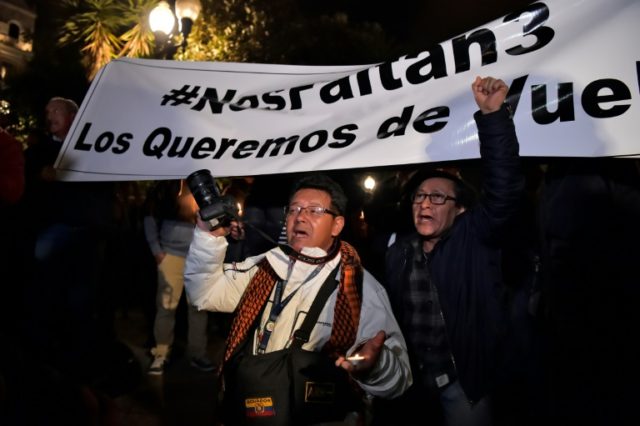Bogota (AFP) – Dissident Colombian rebels are believed to be holding hostage two Ecuadoran journalists and their driver who were abducted this week, the head of Ecuador’s armed forces said Wednesday.
General Alberto Mejia told RCN radio that “the head of this group is the terrorist known as ‘Gaucho,’ and he is without doubt the person responsible … for the kidnapping.”
The reporter, photographer and driver, all working for the prominent Ecuadoran newspaper El Comercio, were seized early Monday in the village of Mataje, in Esmeraldas province, according to officials.
The area where the abduction happened has seen increased Ecuadoran military activity in a crackdown against armed insurgents who have split from Colombia’s former rebel group FARC, which has laid down arms and become a political party under a 2016 peace deal.
Although Ecuadoran Interior Minister Cesar Nevas said Tuesday the abducted trio were thought to be over the border in Colombia, Mejia said there was “no information” supporting that.
The journalists’ kidnapping has alarmed and unsettled Ecuador, with media saying it was the first such abduction in the country in three decades.
“Gaucho” was identified by Ecuadoran military as Walter Artizala, an Ecuadoran in his 30s who had served as a rebel in the FARC for 15 years, specializing in explosives, drug smuggling and financing.
He was suspected of being behind a blast on Monday that cut power to 200,000 inhabitants of a Colombia border town.
The dissident rebel group he leads is thought to number 70 to 80 people, who move across the Ecuador-Colombia border through jungle and engage in drug trafficking.
A week ago, three Ecuadoran soldiers were killed and 11 were wounded by a bomb as they patrolled Mataje. Other attacks in the Esmeraldas province have wounded 32 soldiers and civilians.
The governments of Ecuador and Colombia have stepped up cooperation to tackle what they term “transnational crime” across their common border.

COMMENTS
Please let us know if you're having issues with commenting.